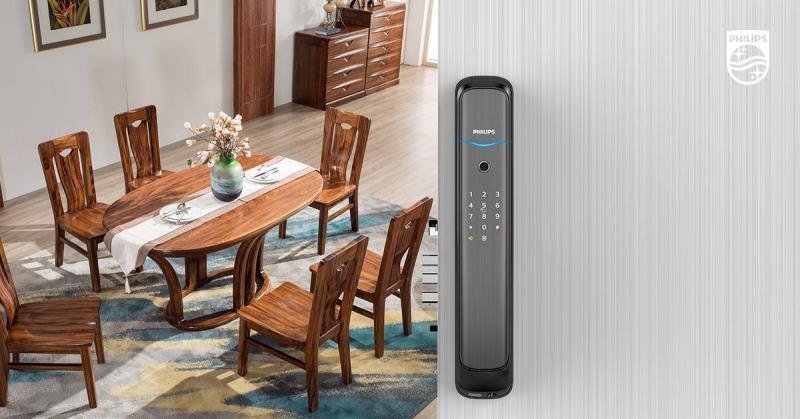Key Takeaways
- Electronic locks provide advanced security features and multiple access methods that enhance convenience and durability for business environments.
- Key factors in selecting electronic locks include security features, ease of use, installation and maintenance costs, and compatibility with existing systems.
- Evaluating reputable vendors and conducting pilot testing are essential steps to ensure the reliability and suitability of electronic locks for a business’s specific security needs.
Why Electronic Locks Are Ideal for Business Security
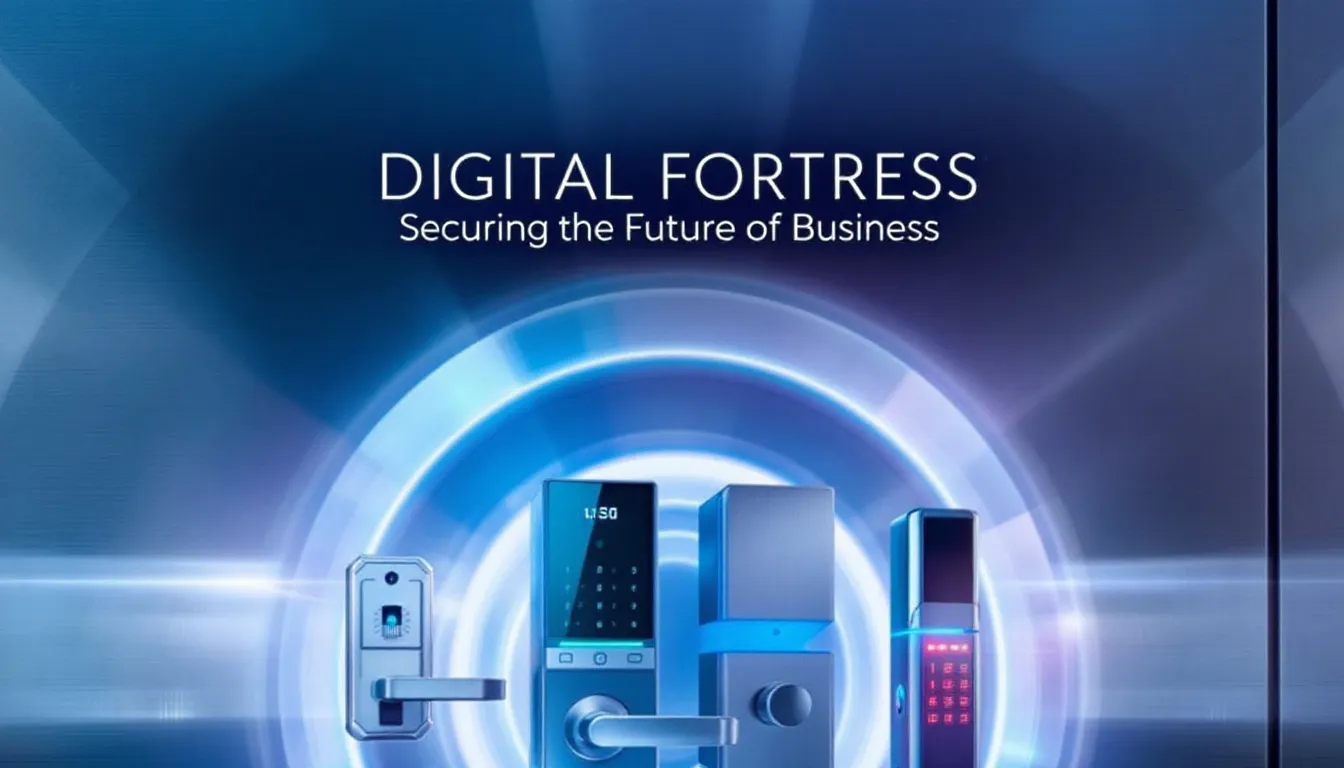
Electronic locks are more than just modern replacements for traditional key-based systems—they are advanced security solutions designed to meet the demanding needs of commercial environments. Unlike conventional locks that rely solely on physical keys, electronic locks offer multiple access methods, including PIN codes, keycards, biometrics, and smartphone control. This flexibility enhances both security and convenience, especially in high-traffic business settings.
Built for durability and reliability, electronic locks are engineered to withstand frequent use, making them ideal for offices, retail stores, warehouses, and other commercial properties.
Choosing the right electronic lock is a crucial step in maintaining business security. It requires careful evaluation of factors such as lock type, features, integration capabilities, and cost—all of which should align with your business’s specific needs.
In this guide, we’ll explore what distinguishes electronic locks from traditional options and provide insights into the best types of electronic locks for securing commercial spaces effectively.
What is an electronic lock?
Electronic door locks offer multiple access methods—such as PIN codes, biometric scans, and mobile app connectivity—to deliver enhanced security compared to traditional locks that rely solely on physical keys. Their keyless entry functionality is especially valued, giving users flexible and secure ways to unlock doors without the need for conventional keys, reducing the risk of lost or duplicated keys and improving access control.
Electronic door locks are designed for durability and high-level security, making them ideal for business environments with frequent use and strict access control needs. These systems support multiple users, allowing businesses to manage access efficiently without the hassle of issuing and tracking physical keys. To prevent lockouts due to battery failure or technical issues, many electronic locks are equipped with manual override options, such as mechanical key access or emergency power ports—ensuring reliable entry at all times.
In the end, businesses gain significant advantages by integrating electronic locks into their premises. These locks combine robust construction with advanced technology, offering enhanced security, streamlined access control, and improved user convenience—making them a smart, long-term investment in workplace safety and efficiency.
Types of electronic locks for businesses
There exists a multitude of electronic lock systems tailored to meet diverse business requirements. For high-security applications, magnetic locks are often utilized. These rely on an electric magnet and are designed to be fail-safe, unlocking in the absence of power to permit safe evacuation during emergencies. Electromechanical lock systems can bolster security with advanced features.
Electric strike locks represent another adaptable choice fit for both wooden and metal doors. They operate by disengaging a latch which then permits the door to open upon activation—this makes them a dependable and simple option across various commercial environments that incorporate commercial door locks and electric locks.
Cylindrical locks have gained popularity due to their straightforward installation process and practicality. They may be configured as either fail-safe or fail-secure according to the specific necessities of a business ensuring selection of the appropriate lock for supreme security levels.
For areas requiring heightened protection within businesses, biometric locks present an elevated degree of security as they necessitate unique physical characteristics like fingerprints or iris patterns for verification purposes.
Understanding the variety of electronic locking mechanisms available is essential when selecting the right system to meet your business’s specific access control needs.
Key Factors to Consider When Choosing an Electronic Lock
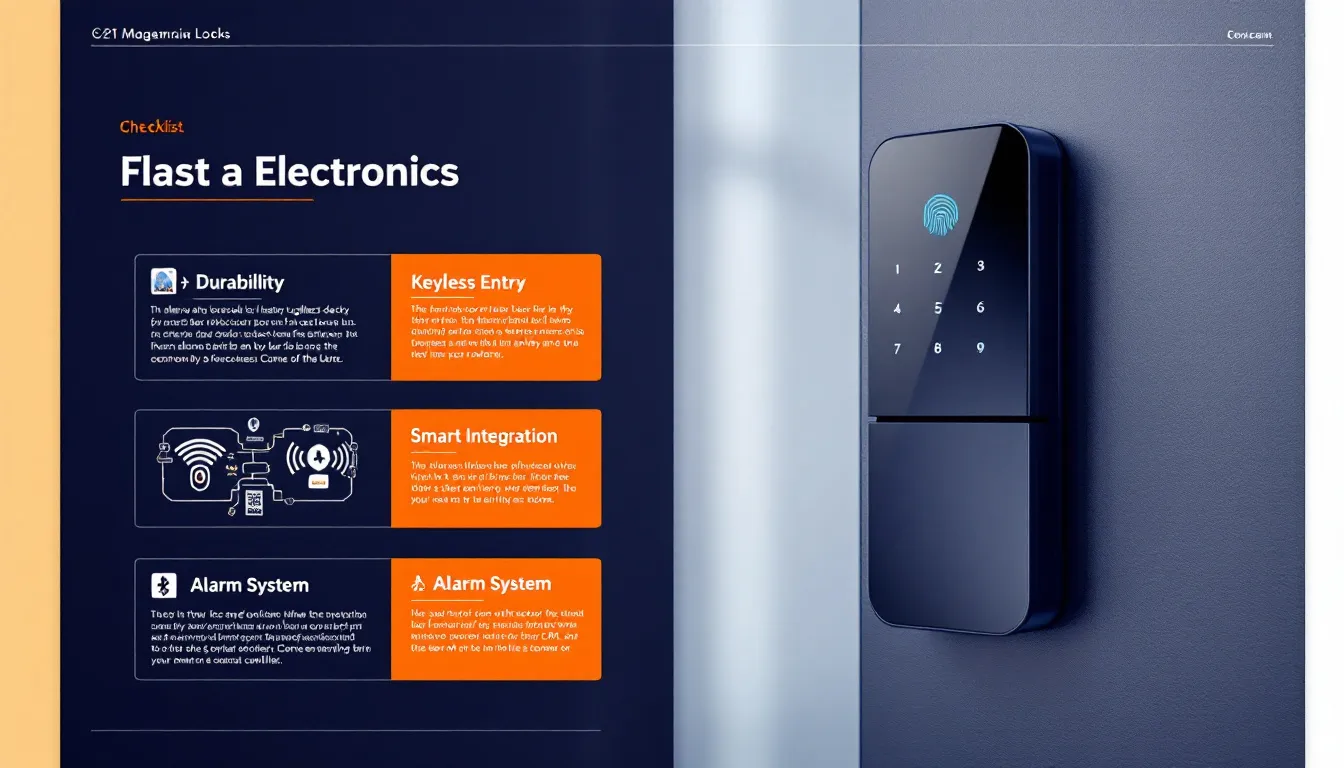
When selecting an electronic lock for your business, it’s important to consider several key factors to ensure the system meets both your security requirements and operational needs. Start by identifying your business’s specific access control demands, then evaluate critical elements such as total cost, hardware compatibility, power requirements, and whether the electronic lock will integrate smoothly with your existing door hardware. Taking a strategic approach to these details helps you choose a solution that balances security, functionality, and cost.
Implementing electronic locks in your business requires strategic planning to ensure both enhanced security and operational efficiency. To make the right choice, it’s crucial to understand the security features each lock offers, evaluate their ease of use for employees or staff, and consider the installation process—including compatibility with existing doors and infrastructure. A well-informed decision will help you streamline access control while strengthening overall workplace protection.
Security features
Modern electronic locks come equipped with advanced security features such as encryption, tamper detection, and multi-factor authentication—all designed to significantly enhance protection. By using encrypted data transmission and requiring multiple forms of verification (such as a PIN and fingerprint or mobile app approval), these systems ensure that only authorized individuals can gain access. This layered approach greatly reduces the risk of unauthorized entry and strengthens overall access control in both residential and commercial settings.
Understanding the difference between fail-safe and fail-secure locking mechanisms is essential when choosing the right electronic lock for your business. In the event of a power outage, fail-safe locks automatically unlock, allowing for safe and quick emergency exits—making them ideal for areas where safety and evacuation are a priority. On the other hand, fail-secure locks remain locked without power, preventing unauthorized access and maintaining security during outages. This distinction is critical for businesses as they evaluate their security needs and develop emergency response plans.
Biometric locks enhance security by using unique biological identifiers, such as fingerprints, to verify a user’s identity. These systems are especially well-suited for high-security areas, where access needs to be strictly controlled and monitored. For businesses implementing biometric technology, it’s essential to comply with data privacy regulations related to the collection, storage, and management of biometric information. Proper adherence ensures both legal compliance and protection of sensitive employee data.
Ease of use
When selecting electronic locks, prioritizing ease of use is key to ensuring a seamless experience for all users. Modern smart locks support multiple access methods, including smartphone apps, fingerprit, Pin codes, and RFID card—greatly enhancing convenience and flexibility. Among these, the smartphone app stands out as a powerful tool, allowing users to lock or unlock doors remotely, receive real-time alerts, manage access permissions, and customize unlocking options. This level of control not only simplifies daily operations but also improves security oversight in both residential and commercial settings.
Granting managers remote access control empowers them to lock or unlock doors from any location—either manually or through automation—for authorized visitors, staff, or service providers. This capability not only enhances security but also improves operational efficiency, especially in dynamic business environments.
Equally important is ensuring that employees are properly trained to use the electronic locking system. A well-informed team can respond to everyday issues quickly and confidently, helping to prevent disruptions and maintain smooth business operations.
Installation and maintenance
Ensuring the correct installation and integration of electronic lock systems into your security system is essential for their optimal performance. Professional services are required for this, which may come at a significant expense, especially when dealing with sophisticated biometric access control systems that require extra hardware components.
Integration with Access Control Systems
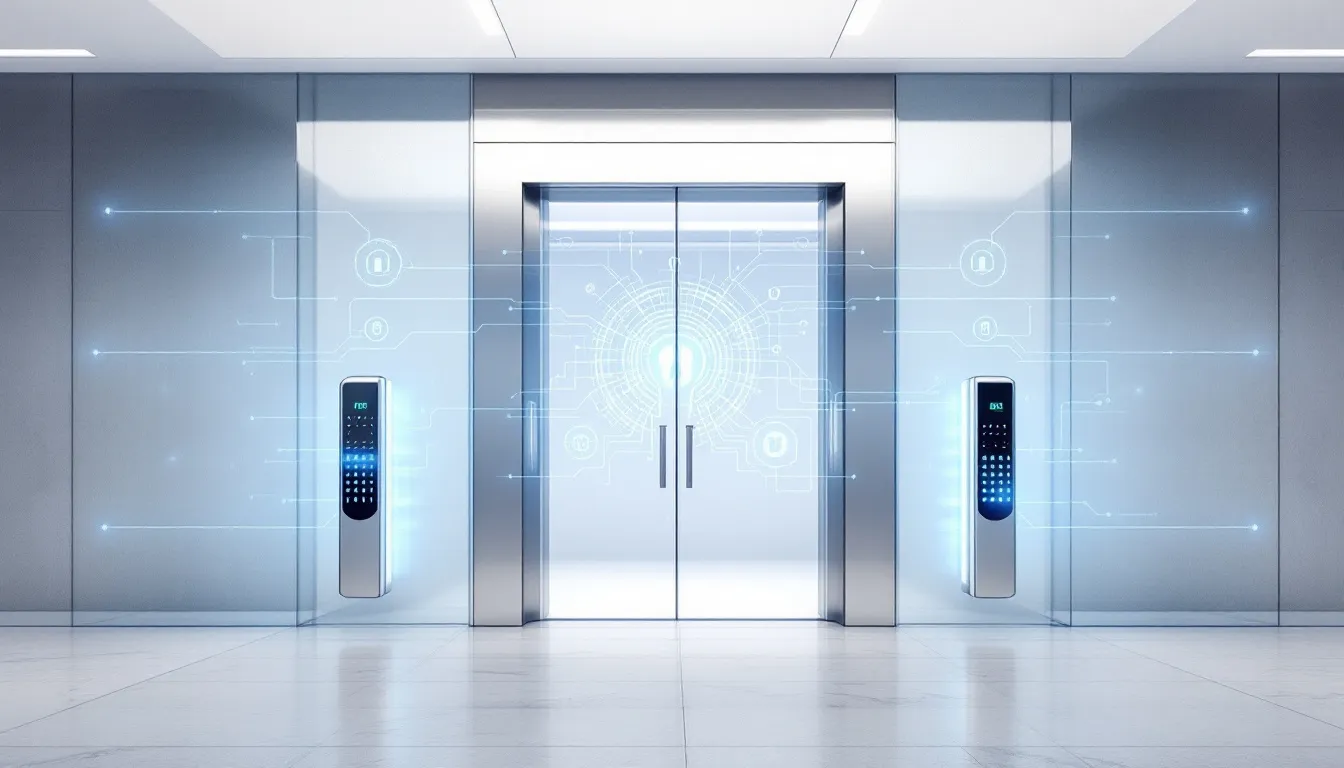
Integrating electronic locks into your broader access control system can greatly strengthen security while streamlining day-to-day operations. Smart locks enable features like remote unlocking, real-time access monitoring, and centralized management of user permissions, giving administrators greater oversight and control from virtually anywhere.
When businesses connect commercial smart locks with their existing access control frameworks, they gain a more cohesive user experience alongside heightened security protocols. Keyless entry setups offer adaptable access options, empowering enterprises to assign entrance rights based on individual roles and timeframes—this ensures that only those with authorization can enter certain zones, maintaining security integrity even if a key is misplaced.
Cloud-based management
Cloud-based management systems offer powerful advantages for overseeing electronic locks, especially in commercial settings. These platforms allow users to remotely control locks from any location, ensuring real-time access management and automatic software updates that keep security features current and effective.
By leveraging the cloud, businesses can enable multi-user access, allowing multiple administrators to manage and monitor locks from different locations. This enhances collaboration, simplifies access control operations, and significantly improves overall security management across the organization.
Cost Considerations
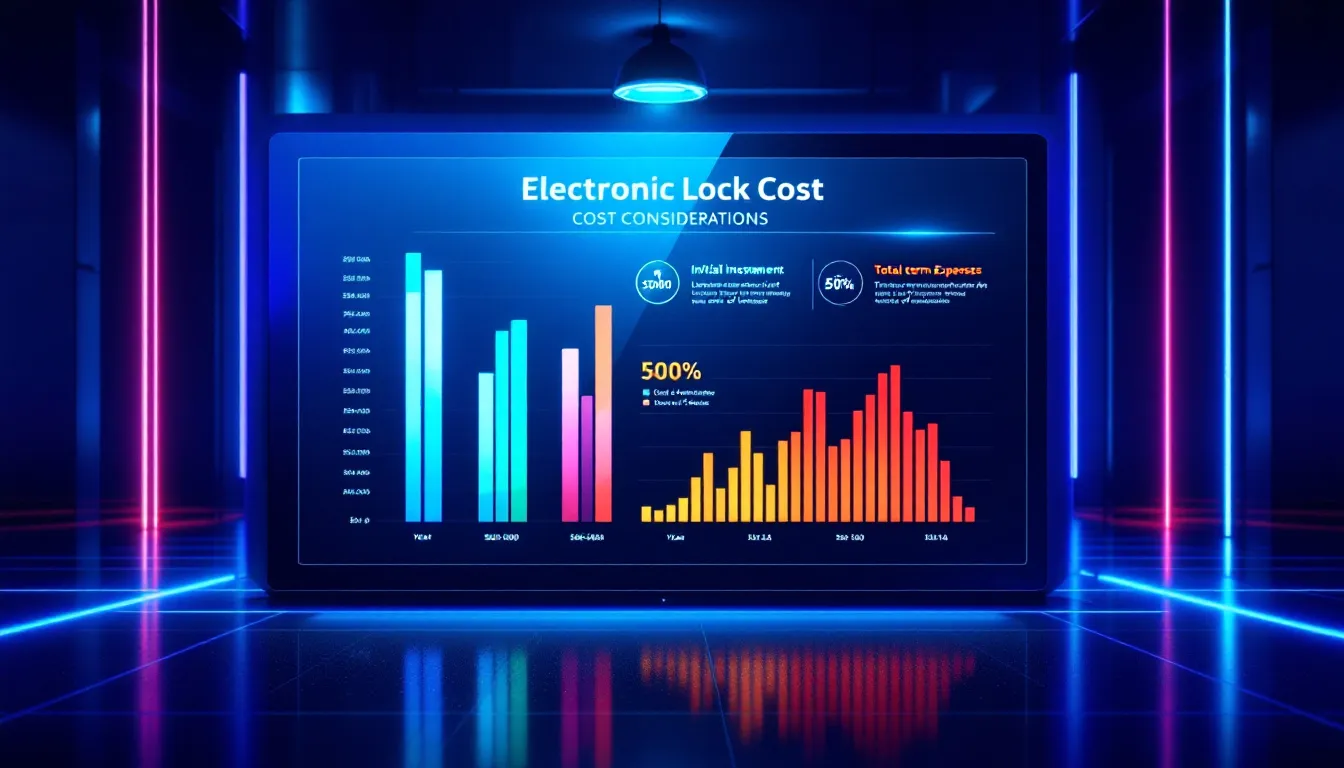
When evaluating different electronic lock systems, it’s important to consider both initial costs and long-term expenses. Assessing key factors such as durability, features, and compatibility with existing infrastructure helps determine the true value of your investment. By factoring in not only the upfront purchase and installation costs but also ongoing maintenance, software updates, and user management, businesses can ensure the selected system remains cost-effective and sustainable over time.
Initial investment
The initial cost of electronic locks can vary widely depending on the type of lock and its features. For example, mortise locks—known for their durability and security—tend to be more expensive than standard cylindrical locks due to their complex design and installation requirements. When choosing a lock, it’s also wise to consider reputable brands that offer comprehensive warranties, as this provides added assurance of the lock’s quality, longevity, and reliability.
Long-term expenses
In addition to the initial investment, electronic locks often come with ongoing costs that businesses should plan for. These may include routine maintenance, software updates, and occasional hardware upgrades. Some systems also require monthly subscription fees for cloud services or advanced features, which can contribute significantly to long-term expenses.
Allocating a budget for these recurring costs is essential to ensure continued performance and security. Regular servicing not only extends the lifespan of the lock but also ensures it continues to meet your business’s evolving security requirements effectively.
Choosing the Right Type of Electronic Lock for Your Business
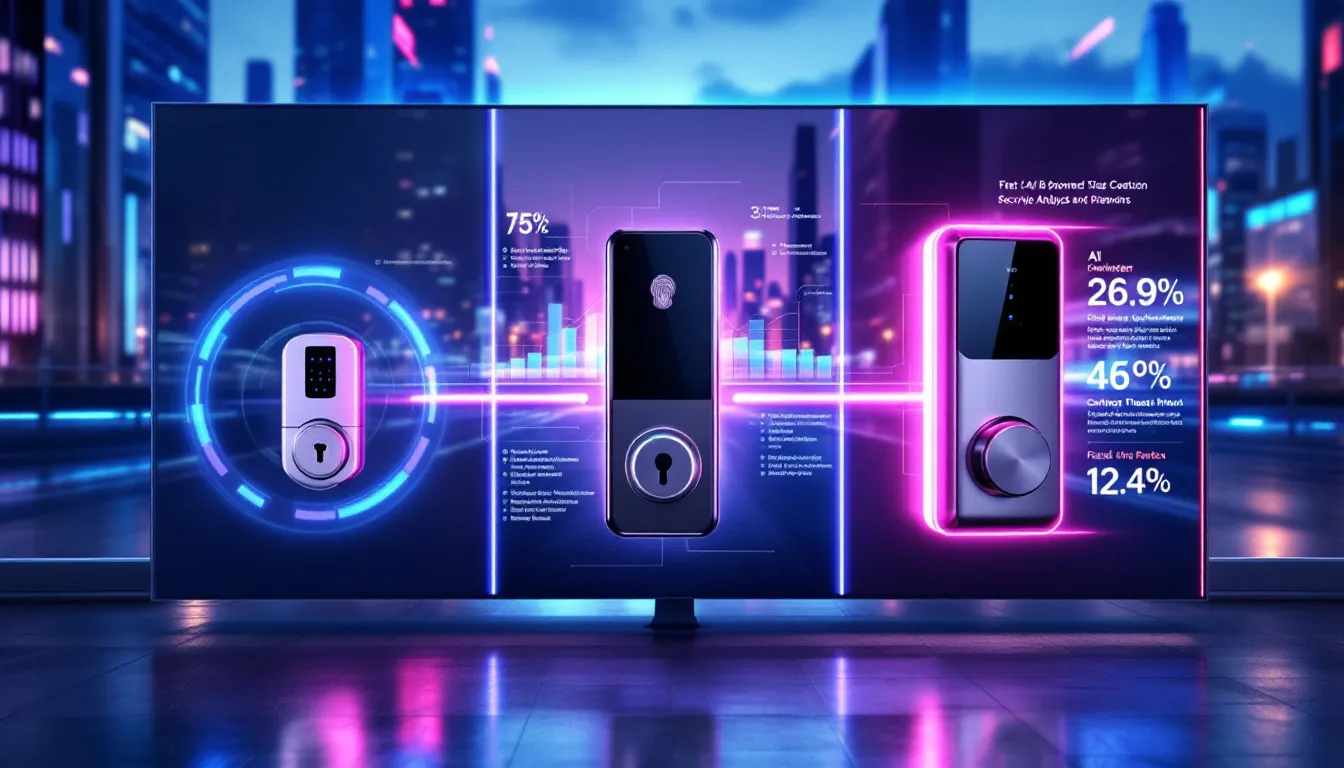
Selecting the right electronic lock system starts with a clear understanding of your business’s unique security requirements. Key considerations include the volume of foot traffic, the sensitivity of the areas being secured, and the number of access points that need to be managed. By evaluating these factors alongside the features and capabilities of different lock types, businesses can identify the most suitable solution to ensure both security and operational efficiency.
Sensitive areas
Security specialists assert that heightened security protocols are imperative for safeguarding critical assets and sensitive data within a business owner’s premises. Biometric locks provide enhanced protection by utilizing fingerprint or iris scanning technology, rendering physical keys unnecessary. Their distinction lies in the absence of a traditional key requirement.
Multiple entry points
Most businesses can greatly enhance both security and operational efficiency by installing electronic locks across multiple entry points. These systems allow for centralized management, real-time monitoring, and seamless integration with existing access control infrastructures—a key advantage for modern companies seeking streamlined security solutions.
By implementing electronic locks at all major access points, business owners gain greater oversight, faster response capabilities, and increased peace of mind. This comprehensive approach plays a vital role in elevating overall protection and maintaining a secure, well-managed environment.
Evaluating Vendors and Products
Choosing the right electronic lock supplier is just as important as selecting the lock itself. Conducting a thorough evaluation of both the product and the vendor ensures you invest in high-quality, reliable locking systems. Be sure to assess a supplier’s reputation, industry experience, and customer reviews to confirm their credibility and commitment to delivering dependable security solutions.
When comparing vendors, prioritize those who offer comprehensive warranties and responsive customer support. These services not only reflect confidence in their products but also provide added peace of mind and long-term satisfaction with your electronic lock investment.
Researching reputable brands
Opting for well-established electronic lock brands helps ensure you receive high-quality products backed by reliable customer service. These reputable manufacturers are known for their product durability, consistent performance, and strong commitment to customer support—critical factors that enhance the overall security of your business.
Investing in a trusted brand not only delivers a more satisfying user experience but also provides greater peace of mind, knowing your business assets are protected by proven, industry-recognized solutions. In the long run, this decision supports both security effectiveness and long-term value.
Reading reviews and testimonials
Customer reviews and testimonials offer valuable insight into the real-world performance and reliability of electronic and smart locks. Review platforms that aggregate user ratings make it easier to compare different models, highlighting strengths and weaknesses based on firsthand experiences.
By analyzing consumer feedback, you can gain a clearer understanding of how a smart lock performs over time, helping you make a well-informed, confident decision when choosing the best option for your home or business security needs.
Testing and Implementation
Testing electronic locks in real-world scenarios is a crucial step to ensure they function effectively and meet the demands of your specific business environment. Practical testing helps verify the lock’s reliability, ease of use, and compatibility with your day-to-day operations.
Assessing performance under actual conditions confirms that the lock can consistently deliver the level of security and convenience your enterprise requires. This hands-on approach reduces the risk of future issues and ensures that your chosen solution is both dependable and well-suited to your workplace.
Pilot testing
Conducting a pilot test allows businesses to assess whether electronic locks meet their operational requirements before committing to a full-scale deployment. By involving a select group of users in the trial phase, organizations can identify potential issues, test usability, and ensure smooth integration with existing security systems.
This critical step helps validate that the lock’s features, performance, and compatibility align with your business’s unique needs—ensuring the system is both effective and appropriate for broader implementation.
Summary
Selecting the right electronic lock for your business involves thoroughly researching available models, evaluating key factors such as security features, ease of use, and cost-effectiveness. Integrating these systems with your existing access control infrastructure can significantly enhance both protection and operational efficiency.
To make the best decision, conduct supplier evaluations, seek trusted brands, and consider pilot testing to ensure the solution aligns with your unique business needs. Don’t wait—take action now to strengthen your organization’s security by investing in a reliable, high-performance electronic lock system tailored to your enterprise.
Frequently Asked Questions
What are the main benefits of electronic locks for businesses?
Electronic locks offer businesses enhanced security, convenience, and reliability by supporting a variety of access methods such as biometric scans, PIN codes, and smartphone connectivity. This versatility allows companies to tailor access control to different user roles and security zones.
The flexibility of electronic locks simplifies access management while strengthening overall security, making them an ideal solution for modern businesses looking to safeguard assets and streamline operations.
How do I choose the right type of electronic lock for my business?
When choosing an electronic lock for your business, it’s important to assess key factors such as foot traffic volume, the sensitivity of secured areas, and the number of access points that need to be managed.
For high-traffic areas, options like magnetic locks or electric strike locks are ideal due to their durability and quick operation. In contrast, biometric locks offer a higher level of security and identity verification, making them well-suited for restricted zones or areas that require strict access control.
What are the cost considerations when selecting electronic locks?
When selecting electronic locks, it’s important to look beyond the initial purchase price, which includes the lock model, installation, and any required hardware. Businesses should also factor in ongoing costs such as routine maintenance, software updates, and potential hardware upgrades over time.
By planning for both upfront and recurring expenses, you’ll make a more informed and cost-effective decision—ensuring your investment remains sustainable and delivers long-term value.
Why should I consider reputable brands and read reviews before purchasing electronic locks?
When choosing electronic locks, it’s wise to opt for reputable brands known for their reliability and performance. These factors play a key role in ensuring long-term security and user satisfaction.
Reading authentic customer reviews can provide real-world insights into how well a lock performs in daily use, helping you identify potential issues and advantages. Making informed decisions based on trusted feedback increases the likelihood of selecting a solution that truly meets your business or personal security needs.

